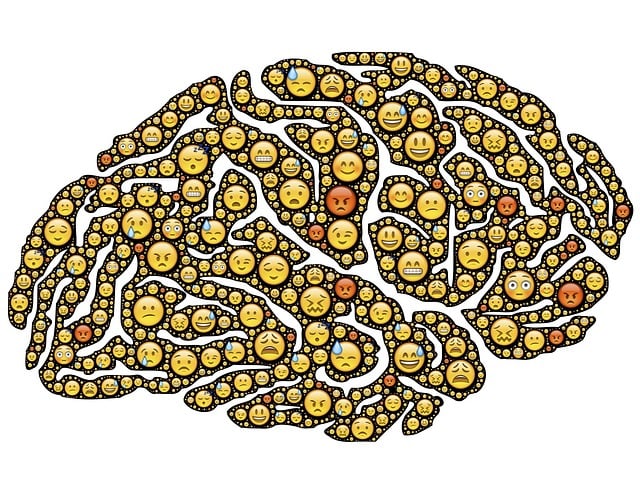In today's stressful world, Englewood Codependency Therapy (ECT) offers a personalized mental wellness coaching program addressing root causes of codependent behaviors, stress, anxiety, and mood disorders. ECT focuses on stress management, communication, and mood regulation through group discussions, role-playing, and reflective practices. This holistic approach enhances well-being, builds resilience, and drives positive life changes. Implementing an effective ECT program requires strategic planning, structured approaches, evidence-based practices, and continuous improvement, ensuring ethical standards and participant-centric care for optimal emotional well-being.
Mental wellness coaching programs are gaining critical importance in today’s fast-paced world, addressing the growing need for personalized support. This article explores the development of such programs, focusing on the integration of proven techniques like Englewood Codependency Therapy. We’ll delve into key aspects, from understanding the demand to implementing and measuring successful outcomes. By examining these strategies, professionals can create comprehensive coaching programs that enhance mental well-being and foster positive change.
- Understanding the Need for Mental Wellness Coaching Programs
- Designing Effective Englewood Codependency Therapy Integration
- Implementing and Delivering the Coaching Program
- Measuring Success and Continuous Improvement Strategies
Understanding the Need for Mental Wellness Coaching Programs

In today’s fast-paced world, the demand for mental wellness coaching programs has never been more pronounced. The increasing prevalence of stress, anxiety, and mood disorders highlights a pressing need for effective support systems. Mental wellness coaching offers a personalized approach to addressing these challenges, focusing on empowering individuals to take control of their emotional well-being. By incorporating strategies such as Stress Management, Communication Strategies, and Mood Management, coaches create a safe space for exploration and growth.
Englewood Codependency Therapy is one such innovative program that recognizes the interconnectedness of mental health and interpersonal relationships. It addresses the root causes of distress, often rooted in codependent patterns, by equipping individuals with tools to foster healthier connections and improve self-care practices. This holistic approach not only enhances overall well-being but also equips people with resilience to navigate life’s challenges more effectively.
Designing Effective Englewood Codependency Therapy Integration

Integrating Englewood Codependency Therapy (ECT) into mental wellness coaching programs requires careful design and consideration. ECT is a highly effective approach that focuses on building healthier relationships and improving communication strategies, addressing core issues related to codependency. By incorporating this therapy, coaches can help clients develop self-awareness, assertiveness, and boundaries, which are essential for managing anxiety relief and fostering personal growth.
The integration should consider cultural sensitivity in mental healthcare practice, ensuring that the approach respects diverse backgrounds and beliefs. This involves tailoring the therapy to individual needs while promoting an environment of trust and understanding. ECT sessions can be structured to include group discussions, role-playing exercises, and reflective practices that encourage clients to explore their relationships and patterns of interaction, ultimately leading to positive changes in their lives.
Implementing and Delivering the Coaching Program

Implementing and delivering an effective mental wellness coaching program requires careful planning and a structured approach. At the heart of this process lies the integration of evidence-based practices, such as Englewood Codependency Therapy, which has proven successful in fostering resilience and healing. The coaching program should be meticulously designed to cater to individual needs, incorporating various techniques like self-awareness exercises and mental health education.
A comprehensive strategy involves creating a safe and supportive environment for clients while implementing robust risk management planning for mental health professionals. This ensures that the coaching sessions are not only therapeutic but also adhere to ethical standards. Through regular evaluations and feedback mechanisms, coaches can adapt their delivery methods, making the program dynamic and responsive to participants’ evolving needs.
Measuring Success and Continuous Improvement Strategies

Measuring success is a pivotal aspect of any coaching program, especially in the realm of mental wellness. For Englewood Codependency Therapy (ECT) coaches, evaluating progress involves assessing both short-term and long-term goals. This includes tracking improvements in clients’ emotional well-being promotion techniques, such as reduced anxiety levels and enhanced coping strategies. Regular feedback mechanisms are crucial; they provide insights into the effectiveness of coaching methods and enable coaches to adapt their approaches accordingly. By utilizing evidence-based assessment tools, coaches can accurately gauge success, ensuring that the program aligns with the unique needs of each client.
Continuous improvement is a key strategy for any successful mental wellness coaching initiative. Coaches should analyze trends in client outcomes to identify areas for enhancement. This involves a comprehensive Mental Health Policy Analysis and Advocacy approach, where coaches collaborate with relevant stakeholders to implement evidence-based practices. Regular training sessions on the latest research and techniques can empower coaches to refine their skills, ultimately improving program outcomes. Through such strategies, mental wellness coaching programs can strive for excellence, ensuring that clients receive the best possible support for their journey towards optimal emotional well-being.
Mental wellness coaching programs, such as those incorporating Englewood Codependency Therapy, are vital tools in fostering holistic well-being. By understanding the specific needs of individuals and designing tailored interventions, these programs can effectively support personal growth and resilience. Through careful implementation, measurement of outcomes, and continuous improvement strategies, coaches can create sustainable positive change. This evolving field holds great promise in revolutionizing mental health support, making it accessible and beneficial for all.














